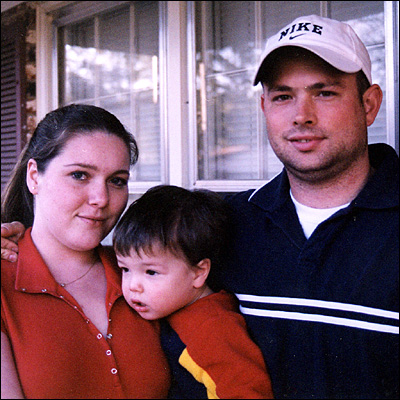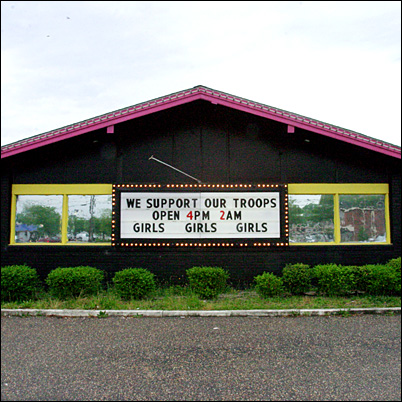 |
 | |||||||||||
The Army Townpart 1 2 3 4 5 6 7 8
"He was supposed to come home several times," says Tabitha. "It was supposed to be a six-month deployment. So he was supposed to come home in October. They extended it to December. Then they extended it to March, and then finally to April to make the year. And then, a week before he was supposed to leave Iraq, he got extended for three months." That latest extension came just a couple of weeks ago. Tabitha fights back tears repeatedly. She's angry at the Army for breaking its promise, but she says she also got mad at her husband. She fought with him over the phone, wanting him to come home, especially since their baby is having minor surgery next week. But Byron can't take time off like a civilian. He can't quit his job without risking jail time. "It was hard for me to understand that, and that put a lot of strain on our relationship," says Tabitha, "because I felt like, you know, something has to be able to be done. Why can't you talk to somebody and why can't you just come home? But like, really, he can't. … They can do whatever they want with him." Tabitha's friend, Heidi Sedek, is also married to a soldier. She says, "It takes a special kind of someone to make it through military deployments...and not cheat or not do the crazy things you hear couples doing." "I'd say three-fourths of the guys that I know over there have done stuff like that," says Tabitha. "They e-mail their wives out of the blue, 'I want a divorce.'" "Or even the other way around," adds Heidi. "Like a lot of guys have gotten 'Dear John' letters." Heidi recalls hearing a story from her husband about a soldier in Iraq who finished a phone conversation with his wife back at Fort Bragg and began throwing things in a rage. "And [the soldier said], 'My wife is cheating on me and the guy she's cheating on me with wants to know where my hammer is!' And he wasn't even mad that she was cheating on him, it was just that he was using his tools." Heidi laughs. Tabitha doesn't seem to find the story very funny. One study found that long deployments can double the divorce rate among military families.
"When I got here, there were four outdoor theaters lined up," says Parker. "And you know they showed sleaze night and day for the Army. … But it changed. Not overnight, but it's changed." Fayetteville leaders have worked to remove the seediest parts of Army life from public display. During the Vietnam War, bar-hopping and drug-using draftees earned Fayetteville a bad reputation and a nickname that stuck: Fayettenam. "There used to be this, the military and the city of Fayetteville often had a two-ships-passing-in-the-night kind of mentality," says Marshall Pitts, the mayor of Fayetteville, "and a lot of the residents who were native to the city of Fayetteville viewed the military with some disdain." That disdain had to do with the partying habits of young soldiers, and their tendency to date local daughters. Fayetteville leaders say the more professional, volunteer military has helped. Now, more soldiers come to town pushing strollers and looking for a church instead of a brothel. In turn, the city has embraced its military identity.
Continue to part 3
| |||||||||||

